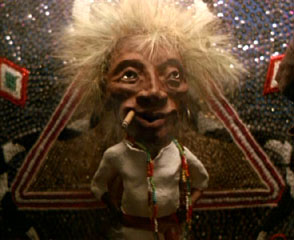|
This is a film that probably succeeded beyond the
wildest dreams of those who dreamt it. It's a baseball comedy which
grossed $49 million despite having nothing on its mind but fun - no
poetic looks at baseball's deeper meaning like The Natural, nor
sentimentalized overviews of generational continuity and forgiveness
like Field of Dreams. Just a bunch of slobs triumphing over snobs,
and underdogs winnin' ballgames. The plot of Major League is very similar to that of The Producers, except in a sports context. Both movies center around trying to build the worst show ever. In this case, a widow takes over the Cleveland Indians upon her husband's demise, and she promptly becomes aware that there are certain circumstances in which a losing team is much better than a winning one. The team is mired in financial and on-the-field mediocrity in Cleveland, but the owner has a very powerful offer to move the team to another city, complete with plenty of tax breaks, and a brand-new stadium with very favorable leasing terms. The move would be a financial bonanza. There's only one hitch - the team has an iron-clad contract with Cleveland, and the commissioner of baseball would never permit them to move ... ... except in one circumstance. (Ah, isn't it always so?) The special loophole in their contract allows them to leave Cleveland if the attendance drops below 800,000 per year. The organization has been pulling in more than 800,000 fans with teams which have been far below average, so the only way to assure that the attendance will sink low enough is to build the worst team ever assembled - a team that isn't even capable of winning 15 games in a 162 game season. The owner makes up a list of the players who will be invited to camp, and it is a collection of has-beens and never-weres. The executives are shocked.
|
|||||||||||||
|
To take the helm of this club, the owner enlists a
manager who has been in the minors for thirty years and also runs an
auto repair shop. When the GM calls him to ask him to manage the
Cleveland Indians, he responds, "I don't think so. Hey, I can't talk
right now. Guy on the other line might need new set of whitewalls." The manager is finally hired, but is not let in on the scam. He thinks he's supposed to win ballgames, but soon sees that it isn't going to be easy. Spring training turns out to be quite similar to the open auditions in The Producers. There are old guys, lifetime minor leaguers, one guy from the California Penal League, and even one guy who wasn't invited at all. The team's strongest hitter practices voodoo and worships a rum-drinking, cigar-smoking god named JoBu. Somehow, against all odds, the rag-tag group starts off winning nearly half of their games, despite the owner's constantly intensifying campaign to make their lives miserable. One day, the soft hearted general manager just can't keep the ugly secret from his boys any longer, so he tells the manager and the team that they were hired because they were the biggest bunch of losers available. This motivates the club, and they ... could ... go ... all ... the ...way. |
 |
||||||||||||
|
JoBu |
|||||||||||||
|
Sure it's corny, and yes, Major League was on the
receiving end of a lot of scorn from contemporary critics when it hit the theaters.
Even the ones who kinda-sorta liked it felt that it was too similar
to Bull Durham. On the other hand, average moviegoers ignored the critics and
generally enjoyed it. Looking back on it from 2005, today's internet
critics generally like it, and it is rated an astronomical 94% at
Rotten Tomatoes! The film has even attained a bit of cult
status over the years. It's rated 6.7 at IMDB, which is quite high
for a lowbrow comedy.
I like it, too. The film has kind of an abrupt ending, but - what the hell - it's a feel-good comedy, so I guess everything ends on the appropriate high note. It isn't split-your-gut hilarious, but it is pleasant, unchallenging fun that is quite a relaxing watch when you want to chill a while. The funniest lines belong to baseball legend Bob Uecker, who plays the team's announcer and really is a baseball announcer (Milwaukee Brewers). Uke was a second string catcher who had the very good sense to pretend he was a much worse player than he actually was, and to turn his most inept playing exploits into a lucrative post-playing career as a deadpan comedian, author, raconteur - and film star! Major League was so successful that it inspired two sequels, but the producers never could get that same financial or entertainment lighting back in the bottle, and the series produced a consistent deterioration in both the quality of the films and their financial performance. The third installment bombed so miserably (only $2m on the opening weekend, despite being in 2300 theaters!) that future theatrical releases are highly unlikely.
|
|||||||||||||
